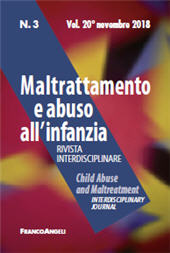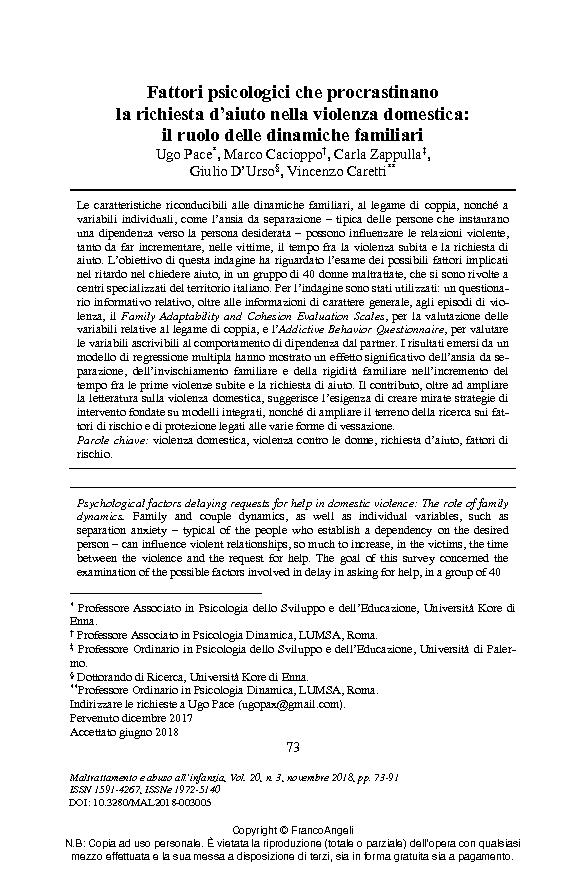Fattori psicologici che procrastinano la richiesta d'aiuto nella violenza domestica : il ruolo delle dinamiche familiari
73-91 p.
Le caratteristiche riconducibili alle dinamiche familiari, al legame di coppia, nonché a variabili individuali, come l'ansia da separazione - tipica delle persone che instaurano una dipendenza verso la persona desiderata - possono influenzare le relazioni violente, tanto da far incrementare, nelle vittime, il tempo fra la violenza subita e la richiesta di aiuto. L'obiettivo di questa indagine ha riguardato l'esame dei possibili fattori implicati nel ritardo nel chiedere aiuto, in un gruppo di 40 donne maltrattate, che si sono rivolte a centri specializzati del territorio italiano. Per l'indagine sono stati utilizzati: un questionario informativo relativo, oltre alle informazioni di carattere generale, agli episodi di violenza, il Family Adaptability and Cohesion Evaluation Scales, per la valutazione delle variabili relative al legame di coppia, e l'Addictive Behavior Questionnaire, per valutare le variabili ascrivibili al comportamento di dipendenza dal partner. I risultati emersi da un modello di regressione
multipla hanno mostrato un effetto significativo dell'ansia da separazione, dell'invischiamento familiare e della rigidità familiare nell'incremento del tempo fra le prime violenze subite e la richiesta di aiuto. Il contributo, oltre ad ampliare la letteratura sulla violenza domestica, suggerisce l'esigenza di creare mirate strategie di intervento fondate su modelli integrati, nonché di ampliare il terreno della ricerca sui fattori di rischio e di protezione legati alle varie forme di vessazione. [Testo dell'editore].
Psychological factors delaying requests for help in domestic violence: The role of family dynamics. Family and couple dynamics, as well as individual variables, such as separation anxiety - typical of the people who establish a dependency on the desired person - can influence violent relationships, so much to increase, in the victims, the time between the violence and the request for help. The goal of this survey concerned the examination of the possible factors involved in delay in asking for help, in a group of 40 abused women who turned to specialized centers of the Italian territory. Participants were administered the Family Adaptability and Cohesion Evaluation Scales, for the evaluation of the variables related to the couple bond, and the Addictive Behavior Questionnaire, to evaluate the variables ascribable to the behavior of dependence on the partner. In addition, information about the episodes of violence were collected.
The results from the multiple regression model showed a significant effect of anxiety from separation, family entanglement and family rigidity in increasing the time between the first violence and the request for help. The contribution, in addition to expanding the literature on domestic violence, suggests the need to create targeted strategies of intervention based on integrated models, as well as expanding the field of research into risk and protection factors related to the various forms of harassment. [Publisher's text].
Fait partie de
Maltrattamento e abuso all'infanzia : 20, 3, 2018-
Articles du même numéro (disponibles individuellement)
-
Informations
Code DOI : 10.3280/MAL2018-003005
ISSN: 1972-5140
KEYWORDS
- Violenza domestica, violenza contro le donne, richiesta d'aiuto, fattori di rischio
- Domestic violence, violence against women, help request, risk factors



